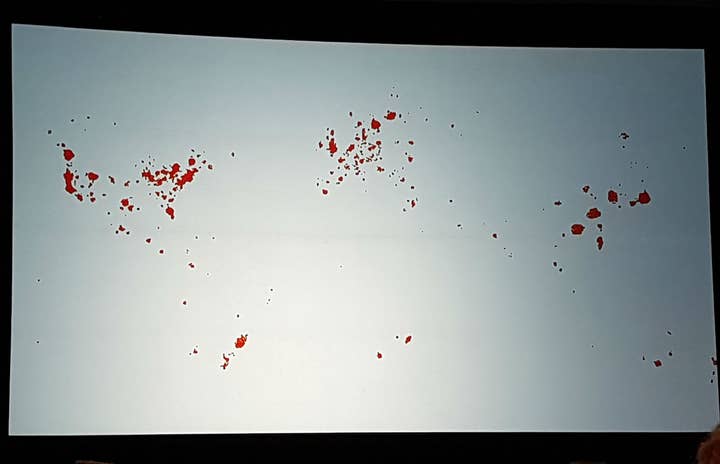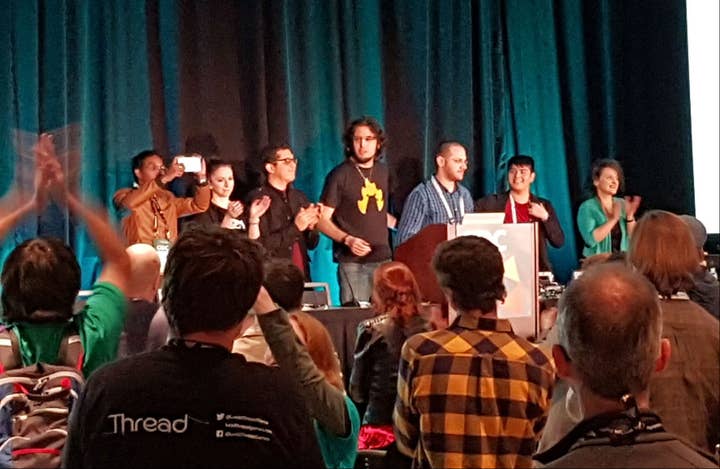People of the Year 2018: Rami Ismail
Vlambeer's co-founder received the GDC Ambassador award, in recognition of years spent reaching out and giving voice to the world's emerging development communities
Whenever we assemble our shortlist for People of the Year, we tend to focus on individuals and organisations that have excelled over the previous 12 months. In any given year, that standard informs the majority of our choices, but there is always at least one that feels somewhat arbitrary; a person or organisation that makes such a consistently positive contribution to the industry that they could merit a place in any year -- even every year.
Last year, Chris Dring made this point when explaining why the truly wonderful SpecialEffect was among our choices for 2017. This year, I am making the same point in relation to Rami Ismail, whose role in co-founding the indie studio Vlambeer is -- in my view, at least - the smaller part of his contribution. I love Ridiculous Fishing, but Vlambeer's gift for combining aesthetics and mechanics is not the reason Ismail is on this list.
To begin to understand, you can look to this year's Game Developers Conference, where Ismail received the Ambassador award. However, while that honour arrived in 2018, it was in recognition of years of diligent and selfless effort. This effort manifests in a variety of ways, but they are all unified by Ismail's desire for the games industry to be a more open and accessible environment to all people, regardless of the size of their bank balance, the breadth of their experience, or, crucially, the countries and cultures with which they identify.
"Ismail's GDC Ambassador award arrived in 2018, but it was in recognition of years of diligent and selfless effort"
Many people reading this article will be familiar with presskit, which Ismail devised as a free resource to help small teams communicate more effectively with journalists. Indeed, many of you may be using that tool already, given how frequently I encounter it when researching independent studios. However, if all you know about Ismail is Vlambeer's games and presskit, you are still missing the most important part of the overall picture.
If you were one of the hundreds that packed out GDC's largest room for the #1ReasonToBe panel this year, then rose to their feet as one after hearing the stories of persistence from the developers who Ismail invited to take part, you will have a better idea. The #1ReasonToBe panel started as a platform for women in the industry to share their experiences, but in Ismail's short time as moderator he has broadened its scope to show that inequity goes much further than gender, and far beyond the shores of established games industries like those in North America and Europe.
Ismail articulated this point brilliantly (he has a knack for that, too) at the start of #1ReasonToBe this year. GDC attendees had been invited to place a pin in a map of the world located in the entrance hall; a neat way to illustrate the global reach of the industry's premier developer conference. However, Ismail removed the outlines of the world's land masses, leaving only blobs of red where pins had been placed, and used the resulting image as a slide in his presentation. The smattering of splodges that remained had much to say about what is ignored when the industry tells itself that GDC is a global event.

"It's supposed to be a map of the world," Ismail told the crowd, "but it's actually a vague outline of the US, a little blob of Europe, some spots of China and Japan, and maybe a little bit in the far south of America. Apparently, that's supposed to be where people make games.
"The reality is that's not where people make games, because that map would show you a much better picture of the world. This map is the map of people who can come to GDC; who can afford to come to GDC, and who are allowed to come to GDC."
Giving those people a voice is becoming more and more difficult. The political climate in the United States has created an environment in which half of Ismail's chosen speakers were denied visas, despite formal invitations from GDC and their flights and expenses being covered. Two of the three backup speakers were also refused entry, as was one of the two people chosen as backups for the backups. Ismail has assisted with visa applications for developers around the world for many years, purely out of desire to help rather than the need to fill seats on a GDC panel. In 2016 he helped four people in this way; by April of 2018 he had already contributed to visa applications for 28 developers from marginalised countries.
"The language of games is supposed to be universal, but for most people around the world, the world itself is not accessible"
Rami Ismail
This speaks to the final aspect of what makes Ismail's contribution to the games industry so much greater than an award received in 2018. He doesn't just talk the talk (though his abilities in this area are close to legend at this point), he also walks the walk -- figuratively speaking, at least, because Ismail's travel schedule pretty much rules out walking as method of getting where he needs to go. I travel enough to widen the eyes of most, and I struggle to comprehend the amount of time Ismail spends in transit.
That, in itself, is not uncommon in the games industry, where certain job roles involve constant movement between a handful of centres of VC wealth and professional opportunity. San Francisco, Seattle, London, Shanghai, Tokyo, and not a great many more; a list as short as it is familiar, but one that far too many see as representative of the 'global' games industry.
Ismail, on the other hand, is drawn to the places where very few others go; to regional developer conferences that I know for a fact struggle to attract internationally renowned speakers, who can help galvanise and guide their emerging creative communities. Not only does Ismail seek out these events and deliver consistently useful and inspiring talks, he engages and socialises with those who come to listen in a way that international visitors seldom do. I often see headline speakers head for the exit shortly after their talk is over. That is never true of Ismail.
These developer communities often exist in places that the industry's biggest and most powerful companies see as markets in which to sell their products or make them at a lower cost, and not untapped sources of new ideas and unique voices. Having visited some of the same places, and met those who work to shape and improve those communities, I can affirm that this dynamic creates a very specific feeling of isolation from the wider games industry; a distance rooted in culture and creed and opportunity, rather than the kilometres between two points on a map.
The games industry is now rightly and admirably engaged with issues around diversity and balance, but these discussions often take place within a bubble. Ismail not only reminds the people on the more privileged side that the bubble exists, but he also seeks to burst it by drawing attention and giving voice to those who find themselves on the outside.
"The language of games is supposed to be universal, but for most people around the world, the world itself is not accessible," Ismail told GDC attendees at this year's #1ReasonToBe panel. "I want to thank you for listening to those that you heard here today, but I want to ask you throughout the next year, and throughout your life, to listen to the people you do not hear, because they are not allowed to speak."

